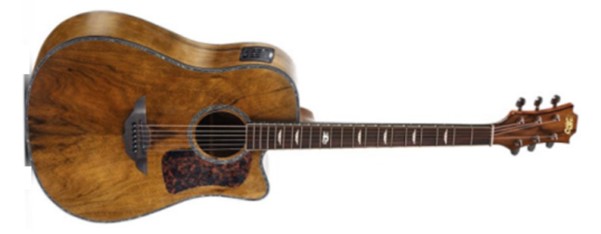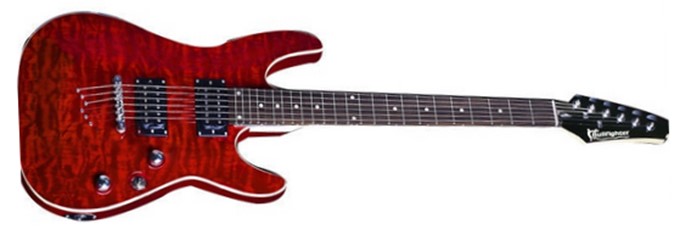
Acoustic or Electric? The Ultimate Guitar Showdown!
Acoustic or Electric guitar? Discover the key differences between acoustic and electric guitars to find the perfect fit for your playing style as a beginner!
magicchords.com


Choosing your first guitar is an exciting milestone, but it can also feel overwhelming with so many options available. Two of the most popular choices are acoustic and electric guitars, each with its own unique characteristics, strengths, and appeal. Understanding the differences between these two types of guitars can help you make an informed decision that aligns with your musical goals and preferences.
🎸 CONTENT:
Acoustic or Electric? The Ultimate Guitar Showdown for Beginners!
Acoustic guitars are often the first choice for beginners due to their simplicity and timeless sound. They produce music naturally, relying on the vibration of the strings and the resonance of the hollow body to create sound. This means you don’t need any additional equipment like amplifiers or cables to start playing. Acoustic guitars are portable and versatile, making them ideal for playing at home, around a campfire, or at small gatherings. They are particularly well-suited for genres like folk, country, and singer-songwriter styles, where the warm, organic tone of an acoustic guitar shines.


One of the advantages of starting with an acoustic guitar is that it can help build finger strength and technique. The strings are typically thicker, and the action (the distance between the strings and the fretboard) is higher, which can be challenging at first but ultimately beneficial for developing dexterity. However, this can also make acoustic guitars harder to play for beginners, especially if you’re not used to the pressure required to press down on the strings. Despite this, many players find the effort rewarding, as the rich, natural sound of an acoustic guitar is deeply satisfying.


On the other hand, electric guitars offer a different kind of appeal. They are known for their versatility and ability to produce a wide range of sounds, from clean and mellow tones to distorted and heavy riffs. Electric guitars rely on pickups to convert string vibrations into electrical signals, which are then amplified through an amplifier. This opens up a world of possibilities, as you can experiment with effects pedals to create unique sounds. Electric guitars are the go-to choice for genres like rock, metal, blues, and jazz, where the ability to manipulate tone and volume is essential.
One of the biggest advantages of electric guitars for beginners is their playability. The strings are usually lighter, and the action is lower, making them easier to press down and play. This can be a significant factor if you’re worried about sore fingers or struggling with chords. Additionally, electric guitars are often more comfortable to hold, especially for younger players or those with smaller hands. However, it’s important to note that electric guitars require additional equipment, such as an amplifier and cables, which can increase the overall cost and make them less portable than acoustic guitars.
When deciding between an acoustic and electric guitar, it’s important to consider your musical interests and goals. If you’re drawn to the idea of strumming chords and singing along to your favorite songs, an acoustic guitar might be the better choice. Its simplicity and portability make it a great option for solo performers or those who enjoy playing in casual settings. On the other hand, if you’re inspired by the idea of playing solos, experimenting with different sounds, or joining a band, an electric guitar could be the perfect fit. Its versatility and ease of play make it a popular choice for aspiring rock stars and genre explorers.
Ultimately, the decision between an acoustic and electric guitar comes down to personal preference. Both types of guitars have their unique strengths, and there’s no wrong choice for a beginner. What matters most is choosing the guitar that excites you and motivates you to practice and improve. Remember, your first guitar is just the beginning of your musical journey. As you grow and develop your skills, you can always explore the other type of guitar later. Whether you choose the warm, natural tones of an acoustic or the electrifying versatility of an electric, the most important thing is to enjoy the process and let your passion for music guide you.


So, should you go for the timeless, natural sound of an acoustic guitar or the versatile, electrifying tones of an electric guitar? Both have their unique appeal, and your choice will depend on your musical tastes, goals, and budget. In this blog, we’ll break down the key differences between acoustic and electric guitars to help you make the best decision for your beginner journey.
Useful tips for beginner guitarists: How to Hold the Guitar and Pick Correctly
Electric or Acoustic? The Basics – What’s the Difference?
Before diving into the details, let’s start with the basics. Acoustic guitars produce sound naturally through the vibration of their strings, which resonates in the hollow body of the guitar. They’re self-contained and don’t require any additional equipment. Electric guitars, on the other hand, rely on pickups to convert string vibrations into electrical signals, which are then amplified through an amplifier. This allows for a wide range of sounds and effects.


Understanding this fundamental difference is key to deciding which type of guitar aligns with your musical aspirations. Are you drawn to the raw, organic sound of an acoustic, or do you dream of experimenting with distortion, reverb, and other effects?
The Acoustic Guitar – Warmth and Portability
Acoustic guitars are a popular choice for beginners, and for good reason. They’re simple, portable, and don’t require any additional gear. Just pick it up, and you’re ready to play!
Pros:
Natural Sound: Acoustic guitars produce a warm, rich tone that’s perfect for genres like folk, country, and singer-songwriter styles.
Portability: No need for amplifiers or cables—just grab your guitar and go.
Finger Strength: Playing an acoustic guitar can help build finger strength and technique, which will benefit you if you switch to electric later.


Cons:
Harder on Fingers: Acoustic guitars typically have thicker strings and higher action, which can be tough on beginners’ fingers.
Limited Sound Variety: Without effects or amplification, the sound is more straightforward and less versatile.
If you’re drawn to the idea of strumming chords around a campfire or writing heartfelt songs, an acoustic guitar might be your best bet.


The Electric Guitar – Versatility and Cool Factor
Electric guitars are iconic, versatile, and undeniably cool. They’re the go-to choice for rock, metal, blues, and jazz players, but they can handle almost any genre with the right setup.
Pros:
Easier to Play: Electric guitars usually have lighter strings and lower action, making them more comfortable for beginners.
Endless Sound Options: With amplifiers and effects pedals, you can create a wide range of tones, from clean and mellow to distorted and heavy.
Great for Bands: If you dream of playing in a band or jamming with friends, an electric guitar is a must.


Cons:
Additional Costs: You’ll need to buy an amplifier, cables, and possibly effects pedals, which can add to the overall cost.
Less Portable: Electric guitars require more equipment, making them less convenient to carry around.
If you’re inspired by guitar legends like Jimi Hendrix, Slash, or John Mayer, an electric guitar might be the perfect choice for you.
Budget Considerations – Which is More Affordable?
Budget is a major factor for most beginners. Let’s break down the costs:
Acoustic Guitars: Generally, acoustic guitars are cheaper upfront because they don’t require additional equipment. You can find decent beginner models for 100−100−300.
Electric Guitars: While you can find affordable electric guitars in the same price range, you’ll also need to budget for an amplifier (50−50−150) and cables (10−10−20). This makes the initial investment higher.


That said, there are great beginner options for both types, so don’t let budget alone dictate your decision. Consider your long-term goals and choose the guitar that excites you the most.
Acoustic or Electric? Playability – Which is Easier for Beginners?
You didn’t come this far to stop: Simple Chords: Smokie – Living Next Door To Alice
Playability is a key consideration for beginners. Here’s how the two types compare:
Acoustic Guitars: Thicker strings and higher action can make them harder to play initially, but they’re great for building finger strength and technique.
Electric Guitars: Lighter strings and lower action make them easier to play, especially for beginners who are still developing finger strength.


If you’re worried about sore fingers or struggling with chords, an electric guitar might be the more beginner-friendly option. However, if you’re willing to put in the effort, starting on an acoustic can set you up for success in the long run.
Making Your Decision – Which Guitar is Right for You?
Ultimately, the choice between acoustic and electric comes down to your personal preferences and goals. Here are a few questions to help you decide:
What kind of music do you want to play?
Acoustic: Folk, country, pop, singer-songwriter.
Electric: Rock, metal, blues, jazz.
What’s your budget?
Acoustic: Lower upfront cost.
Electric: Higher initial investment but more versatility.
How important is portability?
Acoustic: Lightweight and easy to carry.
Electric: Requires additional equipment.
Do you want to play in a band or solo?
Acoustic: Great for solo performances.
Electric: Ideal for bands and jamming.




Start Your Journey with Confidence
Whether you choose an acoustic or electric guitar, the most important thing is to pick the one that inspires you to play. Both types have their unique strengths, and there’s no wrong choice for a beginner. Remember, your first guitar is just the beginning of your musical journey. As you grow and develop your skills, you can always explore the other type later.


So, what are you waiting for? Grab your guitar, start practicing, and let the music begin!




